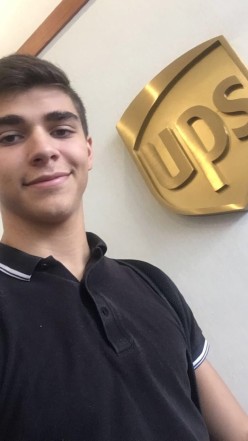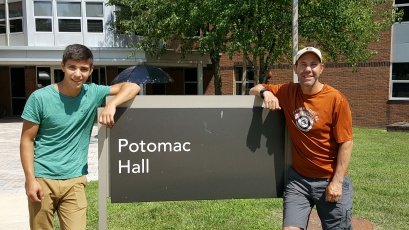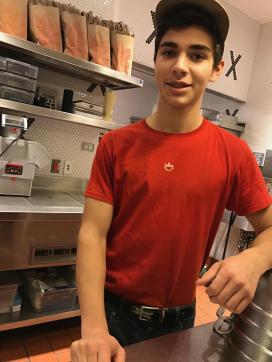She’s Leaving on a Jet Plane: No Failure to Launch
My daughter literally has launched herself into adulthood.
The cornerstone job as a parent is to help your kids launch themselves successfully into adulthood by fostering their independence, confidence, self-identity, decision-making ability, sense of responsibility and motivation – traits which they have to develop themselves but over which parents have a big influence.
I’m proud and excited to see my 21-year-old daughter Rebecca exhibiting these traits. She has jetted off for Toulon, France, on the Mediterranean coast, for an eight-month  assignment teaching English in two French middle schools, her first professional job after graduating college. This will be her second tour abroad, following a semester in college in which she studied at the University of Lyon in Lyon, France, and traveled throughout Europe.
assignment teaching English in two French middle schools, her first professional job after graduating college. This will be her second tour abroad, following a semester in college in which she studied at the University of Lyon in Lyon, France, and traveled throughout Europe.
Rebecca landed in Toulon September 18, 2017, not knowing anyone, same as when she ventured to Lyon in a study group comprised of American students from across the country. She was anxious and excited, the eagerness and thrill of the adventure, opportunity, unknown and challenge far outweighing any fears and doubts. I congratulate Rebecca on her adventurous spirit and desire to explore the world.
No Failure to Launch here, unlike Matthew McConaughey’s 30-something character in the 2006 movie of that title, who resisted leaving the comforts of the cushy life provided by his parents until they hatched a plan to finally get him to launch out on his own.
Psychology Today labeled “failure to launch” as a syndrome characterized by the “difficulties some young adults face when transitioning into the next phase of development—a stage which involves greater independence and responsibility.” Energy, desire and motivation are the necessary ingredients to fuel the launch and overcome fears and anxiety, and taking risks and actions comprise the launch process. Then, resilience and perseverance are required to overcome inevitable turbulence and continue progressing during this stage. Without those components, the post-adolescent risks becoming stuck and dependent.
Ultimately, says Psychology Today author and psychiatrist Robert Fischer, M.D., for a successful launch, a young adult “must tap into and identify a passion or passions, experience the joy that comes with expressing those passions, and have opportunities to share this joy with others. There must be a conscious effort to cultivate not just the logic of the mind, but also the desires of the heart.”
I’m gratified that Rebecca is following her passion and desire by taking the risk and action to travel to France and to teach in foreign schools.
Rebecca is part of an age group that has been segmented recently from the broader adulthood category and coined “emerging adulthood” for its characteristics common to people in their late teens through their 20s. These are young people who feel like the knot in a tug-of-war rope, caught between breaking free of the challenges of adolescence yet often still maintaining close bonds with parents, family and the familiar trappings of youthful existence.
The psychologist who identified the new life-span development phase, Jeffrey Arnett, outlined five distinct features of emerging adulthood:
- Identity exploration: Establishing one’s self-identity continues to evolve throughout the 20s, as young adults search for what brings satisfaction out of education, work, and relationships.
- Instability: This group moves around a lot, among schools, jobs, locations and residences as they experiment with future paths, change their minds and directions and struggle to accumulate the resources to fuel their journeys.
- Self-focus: Emerging adulthood is a time of intensive internal focus, as young adults explore their desires for work, living arrangements, experiences and relationships with a sense of broad possibilities and few encumbrances. It is an age when opportunities may seem limitless, before developments such as marriage, children, increased financial obligations and career choices inevitably pose constraints and redirect attention more outward.
- Feeling in between: Emerging adults feel they are taking more responsibility for their own lives and decisions, yet still feel they have not completely broken free from some form of dependence and do not completely feel like an entirely self-sufficient, autonomous adult.
- Age of possibilities: Optimism characterizes emerging adulthood. After taking a hard look at their parents’ lives, many believe they have a good chance to create a more rewarding and exciting life for themselves.
Another researcher sought to determine why some emerging adults thrive and why some struggle in establishing identities and independence. She found that the foundation for such progress or obstacles are established in childhood and adolescence, and are heavily influenced by parents striking the right balance between providing support, limits and structure, and encouraging kids to pursue independence and make their own decisions.
One type of family dysfunction that inhibits emerging adults from becoming independent is “enmeshment,” when family members’ emotional lives are so intertwined that children have difficulty separating, becoming their own person, and accepting responsibility for their choices and lives. This is a dynamic I have observed often in counseling.
The signs are clear that my daughter is becoming the captain of her own jet. I feel rewarded as a father that I have contributed to the foundation of her launching pad.

 teamwork and communications that comprise effective work environments; play a role in his maturation; and help him build a financial nest egg before launch into the adult world, all while he is still a teenager. That’s what Brown can do for me – and my 19-year-old son Daniel.
teamwork and communications that comprise effective work environments; play a role in his maturation; and help him build a financial nest egg before launch into the adult world, all while he is still a teenager. That’s what Brown can do for me – and my 19-year-old son Daniel. himself from the masses who hold college degrees, which no longer guarantee entry into the professional world, by going the STEM (Science, Technology, Engineering, Math) route and will find himself in demand in the job market. No post-college Parental Unit Domicile (PUD) basement-dwelling likely or necessary for him!
himself from the masses who hold college degrees, which no longer guarantee entry into the professional world, by going the STEM (Science, Technology, Engineering, Math) route and will find himself in demand in the job market. No post-college Parental Unit Domicile (PUD) basement-dwelling likely or necessary for him!